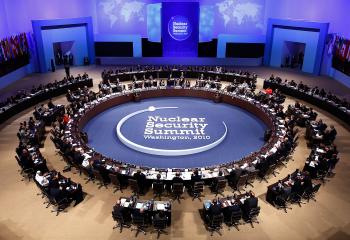While Canada made two commitments at this week’s nuclear summit and joined other countries in endorsing U.S. President Barack Obama’s call to secure nuclear materials against terrorism, a prominent Canadian advocate for nuclear disarmament says Canada needs to do more.
“We need to begin to try to implement President Obama’s vision for a nuclear-weapons-free world. We need to get onboard what Obama is trying to do,” said Douglas Roche.
“He needs support, strong support from countries like Canada, and I think Canada’s support for the Obama agenda so far is too weak,” added Mr. Roche, who has served as an MP for Edmonton, United Nations Ambassador for Disarmament representing Canada, and a senator from 1998 to 2004.
The nuclear security summit on Monday and Tuesday convened by Mr. Obama in Washington, D.C., brought agreement from 47 world leaders on actions over the next four years toward stemming the threat of terrorists obtaining fissile material—plutonium or highly enriched uranium (HEU)—to build nuclear weapons or devices.
Prime Minister Stephen Harper announced that Canada will return spent inventories of HEU from Ontario’s Chalk River Laboratories to the U.S., where it will be made unusable for nuclear weapons.
Canada will also help fund the return of all HEU from Mexico to the U.S. and convert Mexico’s single reactor to use non-weapons-grade low-enriched uranium fuel in a joint project with Mexico, the U.S., and the International Atomic Energy Agency (IAEA).
This project further strengthens the G8 Global Partnership Against the Spread of Weapons and Materials of Mass Destruction, launched in Canada in 2002.
They committed to preventing non-state actors from obtaining information or technology required to build nuclear weapons.
They also stressed the need for laws, regulations and new technology to strengthen nuclear security and voiced support for better international cooperation to deal with illicit nuclear trafficking.
Summit only the beginning
The summit has “only begun to scratch the surface of the problem,” Mr. Roche said.
As a member of the Nuclear Non-Proliferation Treaty (NPT), he said Canada should work with “likeminded countries” like Brazil, Egypt, Ireland, Mexico, New Zealand, South Africa, and Sweden that have formed a coalition calling for greater progress on nuclear disarmament as set out in the NPT.
But Canada has been reluctant to join, he noted, because it is a member of NATO (North Atlantic Treaty Organization) which subscribes to the doctrine that nuclear weapons are essential.
“The position that Canada holds in supporting, on the one hand, the NPT which has called for an unequivocal undertaking, total elimination of nuclear weapons, and on the other hand, supporting NATO, which is nuclear weapons essential—it’s an incoherent position,” said Mr. Roche.
At the same time, the NPT has its own challenges.
India, Pakistan, and Israel were invited to the summit, while North Korea, along with NPT members Iran and Syria, were not invited. The international community views Iran and North Korea as violators of the NPT, and, according to the Associated Press, the U.S. believes Syria also has nuclear ambitions.
The U.S. and Russia signed an arms reduction treaty on April 8 in Prague, but Mr. Roche said “it still leaves them each with 1,500 strategic weapons deployed plus countless reserve weapons and tactical nuclear weapons, so there will still be roughly 22,000 nuclear weapons left in the world, 95 percent of them owned by the U.S. and Russia.”
“The NPT, while it’s very, very important, is subject to erosion right now,” he said, attributing it to “the major powers not fulfilling their Article VI obligations [on disarmament].”
An NPT review conference is held every five years, and the next conference will take place in May in New York. Meanwhile, South Korea will host the next nuclear security summit in 2012.
Seeking a Nuclear Weapons Convention
Mr. Roche is calling for a Nuclear Weapons Convention that would prohibit the development and production of all nuclear weapons by all countries. Adherence would be verified and enforced by international law.
On behalf of over 500 Order of Canada recipients, last Friday Mr. Roche, Nobel laureate John Polanyi, and Pearson Peace Medal recipient Murray Thomson presented Mr. Harper with a cosigned statement in support of a Nuclear Weapons Convention.
“Someday there will be such a treaty or there will be nuclear war. It’s pretty easy to foresee one or the other would happen,” Mr. Roche said.
He noted a warning last November from former IAEA director-general Mohamed ElBaradei, who said more than 200 incidents of illicit trafficking were reported to the agency over the past year and that this figure might well be only “the tip of the iceberg.”
Mr. Roche added that former U.N. secretary-general Kofi Annan has said the world is “sleepwalking” toward a nuclear disaster.
“Sufficient political will” already led to two global treaties banning chemical and biological weapons, Mr. Roche said.
“Countries seemed to understand the damage that [those weapons] were doing, and they’ve forgotten that nuclear weapons would have a global catastrophic effect.”











